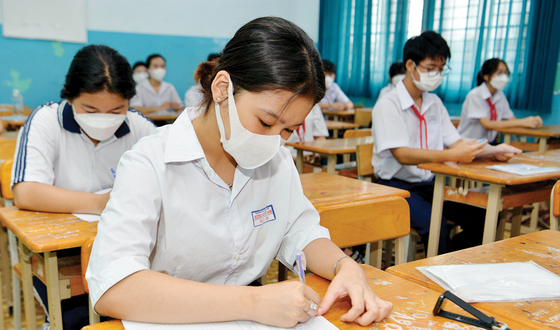 |
Candidates take the 10th-grade entrance exam at Suong Nguyet Anh Secondary School, Ho Chi Minh City. Photo by CAO THANG |
Preliminary data reveals that this year, the exam scores of three required subjects including Literature, Mathematics and English do not experience much change compared to the previous school year.
In particular, the number of math tests scoring above average accounts for nearly 55 percent, mostly ranging from 5 to 7 points, with fewer tests scoring 10 than last year. Regarding foreign language tests, about 32 percent of the tests get good marks (8 points or above), with 2.2 percent of the tests scoring 10. This is also the subject with the highest number of tests scoring 8 or above in this year's entrance exam. When it comes to Literature, roughly 90 percent of the tests get above average scores, 12 percent of which get 8 points or above. According to the Board of Examiners, the number of tests with zero marks in Literature and Mathematics this year is lower than that of the 2022-2023 school year.
As planned, on June 20, the HCMC Department of Education and Training is to announce the results of the 10th-grade entrance exam. Candidates may submit their application for re-examination from June 21 at their current secondary school. On June 24, the admission scores for specialized, and integrated high schools as well as direct admission results shall be announced. From July 11 to August 1, candidates who are qualified for public high schools shall apply for admission at the corresponding school.
In recent days, the Ministry of Education and Training issued Circular 11/2023/TT-BGDDT on the repeal of Circular 23/2014/TT-BGDDT stipulating high-quality training at university level has caused public concern.
In this regard, the Ministry of Education and Training explained that the repeal of Circular 23 was necessary and consistent with the provisions of the 2018 Law on Higher Education. In particular, the Law on Higher Education 2012 stipulates that “the Minister of the Ministry of Education and Training shall stipulate criteria for high-quality training programs; shall be responsible for managing and supervising to keep the tuition fees commensurate with the training quality”. However, according to the provisions of the Law on Higher Education 2018, the concept of high-quality training programs has ceased to exist. The development of different types of training programs is now under the autonomy of higher education institutions, ensuring compliance with regulations on training program standards of higher education levels specified in Circular 17/2021/TT-BGDĐT of the Ministry of Education and Training.
According to the Ministry of Education and Training, the repeal of Circular 23 does not mean that higher education institutions no longer or can no longer launch high-quality programs. Besides, this does not affect the enrollment and implementation of different training programs of higher education institutions. These institutions have the autonomy in designing and developing training programs, as long as they can ensure compliance with regulations on training program standards, and on the quality of inputs, teaching and learning conditions, training process, outputs, as well as other training regulations.
The development and implementation of "high-quality programs" (with higher requirements on output standards, quality assurance, etc.) belong to the autonomy of higher education institutions, said the Ministry of Education and Training.
























